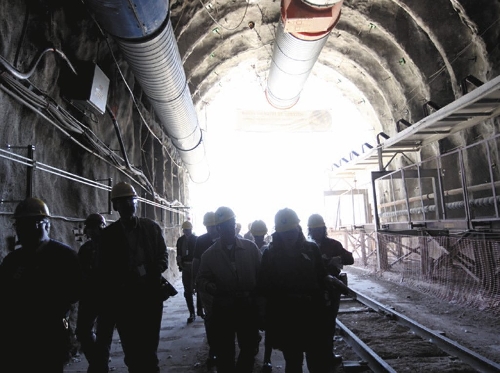Experts recommend new approach to nuclear waste


WASHINGTON — A panel that examined the nation’s sputtering efforts to manage nuclear waste, including the long impasse over Yucca Mountain, recommended Thursday that the government use more carrots than sticks to find new burial ground for the deadliest radioactive material.
The commission said nuclear waste sites should be established through partnerships that give states and local communities opportunities to take part in key decisions and to walk away if they see fit.
It said the “consent-based” approach, empowering localities and fueled with generous subsidies and other job-creating benefits, could be the way to overcome stiff resistance. That resistance is what happened in Nevada, where the state launched an all-out legal and political war in a 25-year fight against a federal nuclear waste plan.
Shortly after taking office in 2009, President Barack Obama terminated the program to dig an underground repository at Yucca Mountain, 100 miles northwest of Las Vegas.
Under orders from the Obama administration, the commissioners were careful not to render an opinion on whether the now-suspended Nevada site — or any other location — would be a suitable repository.
But, the commission said, the government should start to search for another site because the U.S. inventory of spent nuclear fuel soon will outgrow capacity “even if Yucca Mountain goes forward.”
The 158-page report, which recommended broad changes in other areas of nuclear waste management, generally was greeted favorably on Capitol Hill and by nuclear industry groups.
Lawmakers said they recognized some urgency and scheduled hearings for the coming weeks as a step to translate recommendations into legislation.
The matter was made more urgent after the March earthquake and tsunami disaster that crippled the Fukushima Dai-ichi nuclear plant in Japan, damaging the cooling pools that contain spent fuel and causing a re-examination of how U.S. reactors are designed.
It could take years for anything to pass Congress. In the meantime, sources said discussions are under way about what authority Energy Secretary Steven Chu may have to get a head start.
Grass-roots groups in communities near nuclear installations expressed disappointment. It will take years to turn around waste policies, and the panel said little about improving safeguards for nuclear materials at sites where they now are stored, they said.
“Funds should be spent to solidify those wastes and provide robust storage,” said Katherine Fuchs, program director for the Alliance for Nuclear Accountability.
The government has struggled since the 1950s with how to dispose of poisonous end products of nuclear fission. There are 65,000 tons of spent nuclear fuel generated by 104 commercial reactors, with more than 2,000 tons being added each year.
Also, the Department of Energy is storing 2,500 tons of spent fuel and millions of gallons of other high-level wastes at aging government sites in South Carolina, Washington state and elsewhere.
“We believe it is long past time for the government to make good on its commitments to the American people to provide for the safe disposal of nuclear waste,” the 15 members of the Blue Ribbon Commission on America’s Nuclear Future said in the report cover letter to Chu.
The panel recommended setting aside 15 to 20 years to find a repository and get it licensed.
Nevada leaders said the report serves to throw more dirt on the Yucca Mountain program by recommending a new approach to siting a repository, one that is totally opposite to the strong arm they felt from the federal government.
“The changes in nuclear waste policy called for by the commission will lift a threat to Nevada’s future that has hung like a dark cloud over the Silver State for decades,” Rep. Shelley Berkley, D-Nev., said.
“This report provides a path forward for safe, responsible nuclear waste storage so the nation can move beyond Yucca Mountain once and for all,” U.S. Sen. Dean Heller, R-Nev., said.
But advocates for resurrecting the Yucca site said the urgency expressed by commissioners makes it all the more puzzling why Obama chose to cancel the program.
“We believe Yucca Mountain remains the most shovel-ready, thoroughly studied option,” said Reps. Fred Upton of Michigan and John Shimkus of Illinois, Republican leaders on the House Energy and Commerce Committee.
The commission recommended an overhaul of nuclear waste policy, including removing management responsibility from the Department of Energy and placing it in a quasi-government organization that would be dedicated solely to the task.
It also recommended establishing one or more sites where waste now stored at active and decommissioned reactors could be consolidated and monitored.
It said preparations should start soon for a large-scale campaign to transport thousands of tons of radioactive waste to interim storage and eventually a permanent repository.
Several senators, including Senate Majority Leader Harry Reid of Nevada, endorsed the recommendations.
“Most importantly this report makes abundantly clear that no state, tribe or community should be forced to store spent nuclear fuel or high-level waste without its express consent,” Reid said.
Sen. Dianne Feinstein, D-Calif., chairwoman of the energy and water subcommittee, said, “I believe the commission’s recommendation to use a consent-based approach to selecting waste storage facilities — which has worked in other countries — is our best chance to finally solve the challenge of long-term waste storage.”
Commissioners noted that Finland, Sweden, France and Spain have adopted consent-based approaches to waste siting with some successes.
In the United States, the Waste Isolation Pilot Plant disposal site in New Mexico for transuranic wastes was established through a cooperative process with local communities, they added.
“We believe this type of approach can provide the flexibility and sustain the public trust and confidence needed to see controversial facilities through to completion,” the commission said.’
Contact Stephens Washington Bureau Chief Steve Tetreault at stetreault@stephensmedia.com or 202-783-1760.
Blue Ribbon Commission on America’s Nuclear Future, Report to Secretary of Energy (5M)











